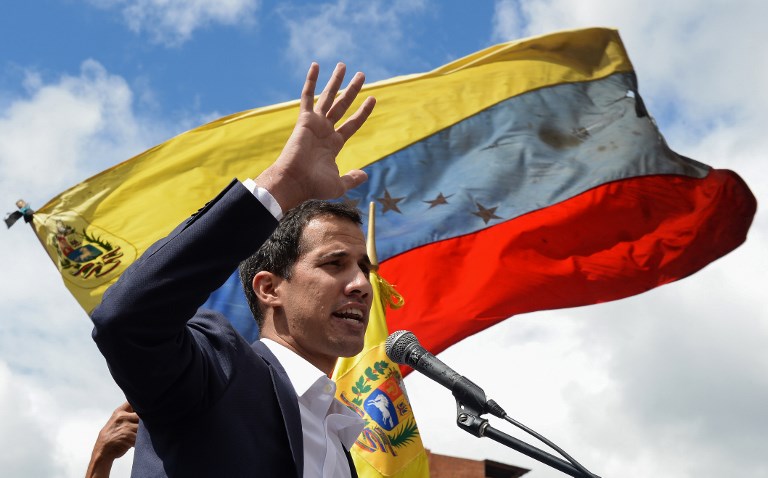Oil without governance behind Venezuela’s meltdown

The battle lines were drawn quite clearly last Wednesday, when Juan Guaido declared himself interim president of Venezuela. The little-known 35-year-old had only served a few weeks as president of the country’s National Assembly before he made the announcement. Nevertheless, he promptly received enthusiastic support from ordinary Venezuelans, as well as from his neighbors in Latin America, the US, Canada and the Organization of American States. European countries followed suit, as well as numerous other countries around the world.
Sitting President Nicolas Maduro protested and was also able to marshal support among Venezuelans, albeit in smaller numbers, and from like-minded countries such as Cuba, Russia, Iran and Syria.
What will happen next is uncertain, as Venezuela has been in a state of chaos for many years. However, it now appears that a breaking point may be around the corner because of troubles at home and open hostility from its near neighbors, including the US. International financial institutions are unlikely to help as they usually do in other cases, as there is no political process to guide any attempt to bail out the country.
Whatever happens in Venezuela, the crisis provides an object lesson to other commodity-producing countries that their wealth could disappear if they do not diversify their economies and reform their ways of doing business, including the business of government.
For a long time, Venezuela represented the classic textbook case of the perils of relying on a single commodity and ephemeral economic prosperity without proper governance.
The first oil field of importance was discovered in Venezuela in 1914 and it soon became one of the world’s largest exporters of crude oil. Economic boom followed and, by 1935, Venezuelans’ income per capita was Latin America’s highest. Oil has been the country’s almost sole export, representing more than 95 percent of its trade earnings, which in turn provided over 90 percent of the government’s revenue. But, more than 100 years after the start of oil production, Venezuela has failed to diversify its economy or the sources of its government revenues. Worse still, its economy has ceased to provide the basic needs and services its 32 million inhabitants require.
As Venezuela boasts the largest oil reserves in the world, it has the potential to become one of the richest countries in the world, yet most of its population lives below the poverty line. It seems that the nation’s wealth was an illusion and transient.
While oil-producing countries normally attract foreign workers, Venezuela has been the opposite. Hundreds of thousands, some say several million, Venezuelans have fled to escape the political chaos and search for work in neighboring countries, which as a result have been tightening their border controls to prevent more from coming.
Almost all economic indicators are ridiculously out of whack. Some economists say that inflation is at over 700 percent and others say it is in the thousands, but nobody really knows for sure. Last year, the government lowered the official exchange rate of the currency (now named the “sovereign bolivar”) by 95 percent, basically destroying people’s savings. It has since adopted an unorthodox anchoring system for the currency that does not seem to be working.
Many oil and gas producers have exhibited similar, but less severe, symptoms of the “resource curse,” including both economic and political distortions.
Abdel Aziz Aluwaisheg
With oil production low, Venezuela is unable to borrow from abroad. It is suffering not only because of US sanctions, but because it has defaulted on some of its loans, including $3 billion in bonds held by Goldman Sachs Group. Long before the US and EU imposed sanctions, Venezuela’s creditors seized whatever assets it had in the US and elsewhere.
The volatility in oil prices has made it difficult for Venezuela to plan properly and maintain a balanced fiscal policy. Oil has also skewed wealth distribution in the country, causing popular discontent and making it possible for populists such as Hugo Chavez and Maduro to capitalize on the disparity without providing solutions. Corruption and a lack of transparency in the oil industry and in government have only deepened the mistrust among the deprived masses.
Corruption in Venezuela is perceived to be high, according to Transparency International — it ranked 168th out of 180 countries worldwide last year. Independent polls have found that 75 percent of Venezuelans believed that corruption was widespread throughout the government, and those perceptions further fueled street protests, which have been raging since at least 2014.
How are other oil producers or single-commodity producers to avoid Venezuela’s fate?
Many oil and gas producers have exhibited similar, but less severe, symptoms of the “resource curse,” including both economic and political distortions. The most glaring examples include Nigeria and Libya, where oil exploitation has led to political upheaval, corruption and economic mismanagement.
Some countries have been able to avoid severe distortions to their economy and society by consciously using their natural resource revenues for sustained development and political stability. Others have been able to cure themselves of the disease and rebalance their economies by fighting corruption and establishing reliable transparency and accountability processes, while reducing subsidies and encouraging investment in other sectors.
Countries that are dependent on oil, gas or other single commodities should closely follow the events in Venezuela and take notes: Economic diversification, good governance, social cohesion and the rule of law are the only remedies to escape Venezuela’s fate.
Abdel Aziz Aluwaisheg is the Gulf Cooperation Council (GCC) assistant secretary-general for political affairs and negotiation, and a columnist for Arab News. The views expressed in this piece are personal, and do not necessarily represent those of the GCC.
Twitter: @abuhamad1










































